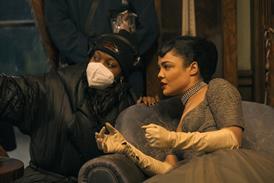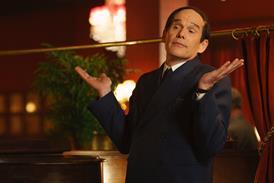Dir: Claude Berri. France. 88 min.
Wistful, wry and touching, The Housekeeper is a small but finely observed tale about a middle-aged man who takes on a young girl as a cleaning woman and gets more than he bargained for. Claude Berri closes out a fabulously successful year as France's leading high roller producer - with Costa Gavras' Amen and Alain Chabat's Asterix & Obelisk: Mission Cleopatra - with a return to form as writer-director. The Housekeeper erases the lingering bad taste of his previous directing effort, La Debandade, which flopped in 1999, and reminds us that Berri is still better suited to films in the quietly intimate modern idiom rather than the epic mode in which he is not always at ease (Germinal, Lucie Aubrac). A modest but genuine success in France (600,000 admissions in three weeks), The Housekeeper could play to modest but genuine art house success abroad on the strength of Berri's name and the glowing appeal of its cast.
In Berri's script, adapted from a recent novel, Jean-Pierre Bacri plays a fifty-something Parisian, a sound engineer in a recording studio, whose wife has recently left him for another man. Bored and lonely in his new bachelor existence, he decides to get a grip on himself by first putting his flat in order. Through an ad he sees in a local bakery, he hires young Emile Dequenne to do his housecleaning once a week. Though Dequenne frankly admits she's never done an ounce of housecleaning in her life, the arrangement seems to work out, since at first Bacri is at work when Dequenne comes around to clean.
That soon changes when Dequenne tells Bacri she's breaking up with her boyfriend she's been living with and has to move out - could she crash on Bacri's couch while looking for a new home' Warily, Bacri agrees to the arrangement. Their early cohabitation is a comic duel of generations as Bacri turns up his classical music to drown out Dequenne's techno tastes.
But the inevitable happens. Bacri and Dequenne start to sleep together. For Bacri it is a welcome relief from his loneliness, but for the young Dequenne it is love. When Bacri's estranged wife starts to harass him with anonymous phone calls and comes around the flat (a powerfully desperate cameo from Catherine Breillat) to beg for a reconciliation, Bacri decides to take Dequenne on holiday to an artist friend's in Brittany. There, the romance peaks and shifts as Bacri finds himself increasingly in love with Dequenne, who gradually transfers her affections to a boy her age. In a bittersweet, open-ended final scene, Bacri, who has caught a cramp while out swimming and nearly drowned, sits on the beach with the mother of Dequenne's new sweetheart, who mistakes Bacri for the girl's father and mentions that she is recently divorced.
Berri has cast the film winningly. Bacri fine-tunes his image as the France's most loveable screen sourpuss, imperceptibly taking the character beyond facile deadpan humour into true emotional depth. Dequenne is simply adorable as the ingenuous, instinctive youth and fully confirms the promise this 21-year-old Belgian actress displayed in an entirely different register in the Dardenne brothers' searing 1999 Cannes hit, Rosetta. There is also fine support from Brigitte Catillon, as a depressed friend of Bacri's who's also been dumped, and Jacques Frantz as the artist friend who only paints chickens. Eric Gautier's fine photography dominates the polished technical aspects.
Prod cos: Hirsh/ Pathe Renn Production/TF1 Films Production
Int dist: Pathe
Exec prod: Claude Berri
Scr: Claude Berri, from the novel by Christian Oster
Cinematography: Eric Gautier
Prod des: Hoang Thanh At
Costumes: Corinne Jorry
Ed: Francois Gedigier
Music: Frederic Botton
Cast: Jean-Pierre Bacri, Emilie Dequenne, Brigitte Catillon, Jacques Frantz, Axelle Abadie, Catherine Breillat

















No comments yet